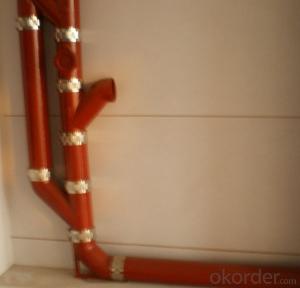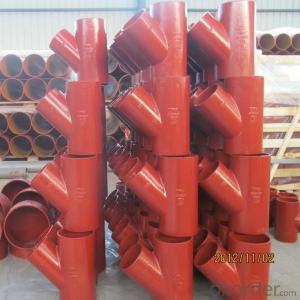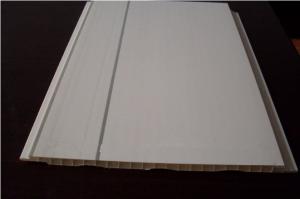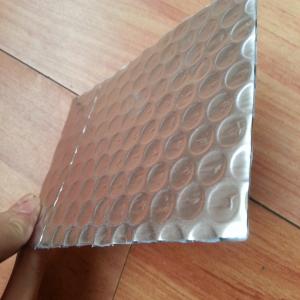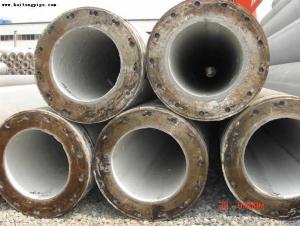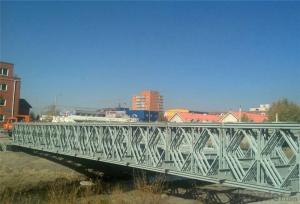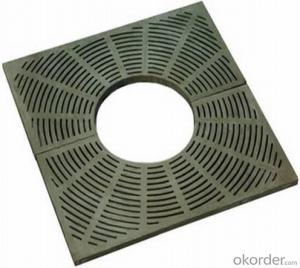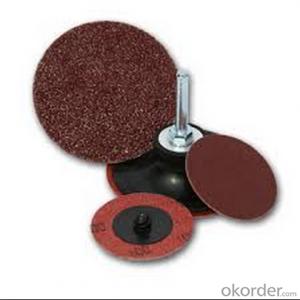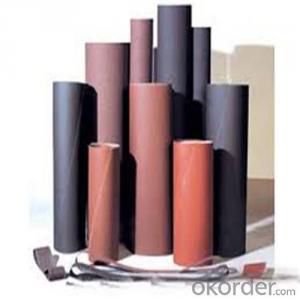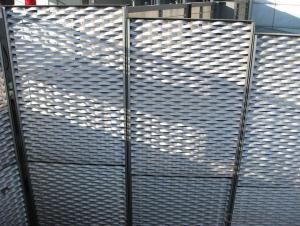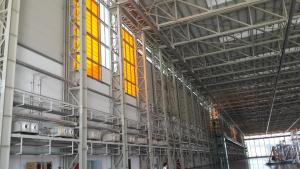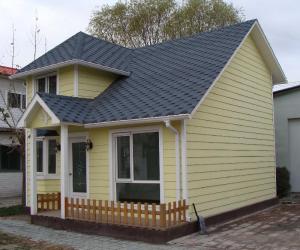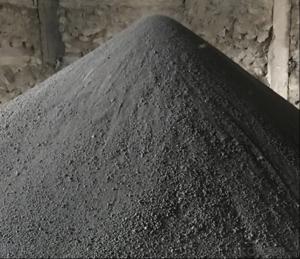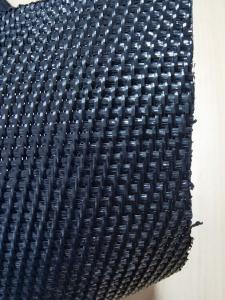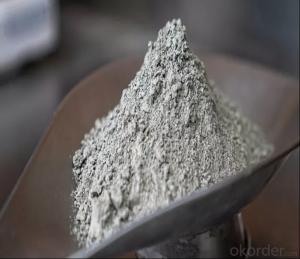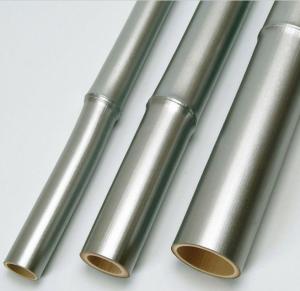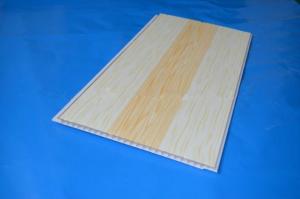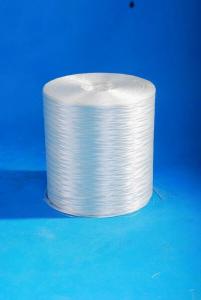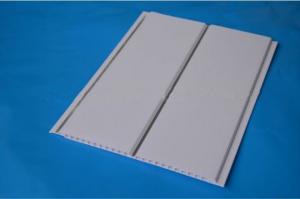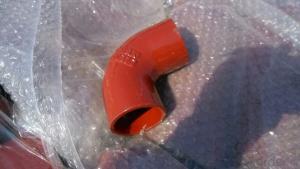EPOXY CAST IRON FITTING DRAINAGE
- Loading Port:
- China Main Port
- Payment Terms:
- TT OR LC
- Min Order Qty:
- -
- Supply Capability:
- -
OKorder Service Pledge
OKorder Financial Service
You Might Also Like
Made from 100% recyclable materials, CMAX epoxy cast iron pipe systems are not only environmental friendly, but also satisfy many properties necessary to withstand the aggressive conditions both internal and external of the pipes and fittings: these properties include its excellent resistance to abrasion, corrosion, impact and fire. CMAX also has low noise transmission compared to common UPVC drainage pipe systems. CMAX is designed as long lasting building materials.
Standard:
CMAX epoxy cast iron pipe systems with nominal size between 40-300mm comply with BS EN 877.BS EN 877 guarantees the quality of the materials, dimensions and tolerances, mechanical properties(like water pressure, tensile strength and brinell hardness) appearance, and the standard coating for the epoxy cast iron pipes, fittings and couplings.
Strength:
Iron is well known for its strength and abrasion resistance. The shape and impact strength of CMAX products are unchanged under exposure of sunlight and weathering, while UPVC and PVC pipes would soften, deform and become brittle under intense temperature change.
Quiet:
CMAX’s sturdy and dense properties reduce pipe vibration a silent drainage system.Studies had proven iron is the quietest material out of all other common drainage system.
Non-Toxic and Non-Combustile:
No toxic gas will be emitted from CMAX in the event of fire. Iron is also non-combustile,so epoxy cast iron pipes and fittings are recoverable after fire.
Anti-Corrosive:
All CMAX epoxy cast iron pipes and fittings are internally and externally finished with corrosive resistant epoxy coating to prevent fouling and corrosion. The epoxy on CMAX epoxy cast iron pipes and fittings provides an excellent exterior under humid and tropical conditions.
Coupling:
Lightweight couplings are specially engineered to guarantee a strong, quick and easy connection between CMAX pipes and fittings. Made from stainless steel with rubber gaskets, the coupling match pipe and fittings non-corrosive properties.
- Q:I hate having to pay 6% to real estate agents and on top of that the additional fees. So if I've found a buyer, what are the steps needed to sell a home in California without going through any real estate agent?
- Things are complicated, really too much for most individuals, part of that average 6% goes to the buyers agent, one compromise is to use a broker charging closer to 3% or a flat fee, but not offering the premium advertising/showing assistance an agent provides.
- Q:Id like to work as a real estate agent for a brokerage. What promotion prospects would I have? How would my career progress?
- Beginners face competition from well-established, more experienced agents and brokers in obtaining listings and in closing an adequate number of sales. In a large firm, you might get a better desk after you make a sufficent number of sells or if you rearch some quota. Other than sells, there may be certain area or specialized markets which you can focus on, but I do consider these promotions. About the only promotion is from real estate agent to licensed real estate broker. For more information I suggest you read the source below
- Q:I'm planning on getting my real estate agents license in the next few weeks. I've heard that Century 21 and some other companies have their own courses. Is it better to attend their course or just a regular local real estate school. Also what companies are good for new agents. Any advice you can give is appreciated! Thanks!Oh and I'll be getting my license in Tenessee.
- Hi Ryan :-) Yes, the larger franchises do offer in-house training. I belong to an ERA Franchise (owned by Realogy who also owns C-21 and Coldwell Banker). I've found the online courses they offer to be excellent as well as convenient since you can do them in the comfort of your own home. Some are webinar formats which are also nice because you have an opportunity to answer questions. As far as getting your license...I would stay with an Independent Program for your Principles...recommend Anthony's or Allied for that. You don't want to contractually obligate yourself to a franchise for your initial schooling. The best way to find a good office is to talk to the local agents. It is really important to find an office that isn't too large and with a broker that is very informed and involved in the day-to-day business. Find an agent who LOVES their office and their broker. How active are they in their community? Are they up-to-speed on the newest technologies available? It is more important for you to find a place where you feel supported, and comfortable but challenged. Take your time so you don't office hop. Commission split is not the most important so don't be tempted by 90% commission splits because 90% of the time you will have NO support from your broker. Most beginners start out in the 50-60% range and work up to 70-75% as they gain experience. You may want to look into a good coaching program such as Mike Ferry or Tim Julie Harris. Both are excellent. Best of luck to you! This is not a seller's market...not a buyer's market....it is a Realtor's market!
- Q:Really broad question, I know, but what are the nuances, elements, and phases of real estate development? I'm writing a business paper for a competition, and I'm also thinking about being an RE developer when I'm older.Here's what I know about RE Development:1) Buy undeveloped land2) Hire contractors to build houses3) Sell houses for profitor1) Buy property (preferably distress property?)2) Fix/renovate3) Rent it out while waiting for market to get better4) Sell for profitThat's my layman's knowledge of RE Development. To be clear of my question, what are the details and fine points of real estate development? What do I need, besides money? What's the best way to get money to finance this?Thanks all
- Real estate development is a vague term and can mean many things. For example it can mean to purchase a parcel of land, have it rezoned into smaller parcels, build its infrastructure (roads, drainage/sewers, utilities), build on each lot either commercial or residential improvements and sell to an end user, or opt to keep them self as investment property. Or, any fraction of the previous sentence. The key issue is to buy unimproved or under-improved land and develop it to make it more valuable to sell/rent at a profit. Real estate developers can approach development from a general contractor point of view, but to do so limits the profitability. Obviously one would need to have an expertise in: their real estate market, local zoning laws and subdivision of lots, infrastructure construction, commercial and/or residential construction, marketing, contract law and finance. Getting money to develop can obviously come from a commercial loan as it is an commercial enterprise. Though it is not uncommon to organize a group of private investors or equity firms to back a project for a cut of the projected profits.
- Q:I know some real estate agents around, but, I don't have the first clue in what to do. I need some questions answered, like what are the first steps in becoming an agent? What kind of classes do i need to take? How many hours of classes? Mature answers only please.
- OK! yes, you need to take real estate courses and pass the tests to get your license to sell RE. There are numerous 'hidden' fees once you go to work for a RE company. I would suggest you talk to a branch manager of a well known RE company. Ask lots of relevant questions. P.S. Not a real good time to get into RE, unless you are willing to ride out the sub-prime mortgage and foreclosure mess.
- Q:some questions that i am wondering: best houses/apartments to buy and when and where? i dont know what exactly, to ask maybe for TIPS on real estate i guess? any other important information is greatly appreciated :)
- When and where? When; you are financially stable with excellent credit, have enough saved up for a down payment, and sufficient income and assets to qualify for a mortgage, as well as enough savings for a cushion in the event of job loss or other emergencies. Where: the area you want to live in and can afford, close enough to your employment that commuting won't be a problem, and in a house or condominium that you will be happy to live in for some time whether the real estate market goes up or down. (there is a cycle every few years).
- Q:real estate prices
- Sounds like an Econ 101 homework question... If people thought real estate prices were going to increase they would want to buy. This would cause demand for money to buy houses. Demand goes up, the price goes up (the banks can be picky and lend to only the best qualified or they can go out and raise more money to lend by offering attractive rates). Interest rates would increase in the classical model. good luck! Real estate prices would also go up as demand would increase.
- Q:I am considering getting into real estate investing in select markets, but have neither the credit nor the money to get started. I would like any suggestions on how to overcome this issue from any experienced investors out there.
- First off you should work on building your credit. You can always look for seller financing. Just make sure your first deal is a slam dunk because that will set you up for many more to come.
- Q:I am looking to buy a house or proprty to build a house within the next couple of years. I was wondering if it might be a good idea to take some classes at the local community college in real estate so that I might be able to get info on how to identify good deals/save $/learn the lingo so that I won't be putting myself in a position to get ripped off when I decide to buy.Would that do any good or would that be a potential waste of time, and I should not bother?
- It never hurts to educate yourself on what could be the biggest investment of your life. But let me go ahead and warn you- these classes can be a bit of a snore sometimes so make sure you bring caffine with you! ;)
- Q:I saw a two bedroom condo in my complex for sale for $65,000.00 online. I pay $600.00 a month for my 1 bedroom apartment. Say I borrowed the $65,000 from a bank to buy the condo. I pay 5% annual interest on a 30 year fixed at $300.00 a month.I can rent out the property for at least $600.00 a month. I'm not sure of my math here but I think I would clear at least $200.00 a month. With owning that property I can borrow against it to buy another property and so on. I guess this is why people get rich in real estate. I see my path but am nervous. What should I do?
- Take a advice from expert real estate agent or professional financial.
1. Manufacturer Overview |
|
|---|---|
| Location | |
| Year Established | |
| Annual Output Value | |
| Main Markets | |
| Company Certifications | |
2. Manufacturer Certificates |
|
|---|---|
| a) Certification Name | |
| Range | |
| Reference | |
| Validity Period | |
3. Manufacturer Capability |
|
|---|---|
| a)Trade Capacity | |
| Nearest Port | |
| Export Percentage | |
| No.of Employees in Trade Department | |
| Language Spoken: | |
| b)Factory Information | |
| Factory Size: | |
| No. of Production Lines | |
| Contract Manufacturing | |
| Product Price Range | |
Send your message to us
EPOXY CAST IRON FITTING DRAINAGE
- Loading Port:
- China Main Port
- Payment Terms:
- TT OR LC
- Min Order Qty:
- -
- Supply Capability:
- -
OKorder Service Pledge
OKorder Financial Service
Similar products
New products
Hot products
Related keywords
